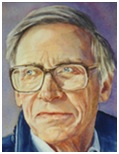|
 |
|
 |
|
|
||
John Rawls - Philosophy and Justice
John Rawls (1921-2002)
American philosopher (pictured right is a portrait by his student, Mardy Rawls) Famous for his ideas about justice and fairness.
His most famous book is... A Theory of Social Justice (1971) What did he say about justice?
1. “Justice as fairness” Justice is:
Rawls's liberty principle states that: Everyone has an equal right to basic liberties (as above) so long as they don't harm the liberty of others. 2. Rules for co-operation We must all work together through rules that further everyone's interests (see point 3).
3. Fair rules for everyone The rules that govern a group or society must apply to everyone irrespective of their social status. To do this, everyone must start from the same position (the “original position”) by casting a “veil of ignorance” over their past lives. All potentially divisive factors (like race, class, natural talent and disability) are disregarded. 4. Equality of opportunity Rawls's justice principle says that everyone must have “fair equality of opportunity” in getting the best jobs.
5. Equality through education Universal quality education is particularly important in achieving equality of opportunity. 6. The rich must help the poor (like Robin Hood pictured right) Rawls's difference principle says that: Social and economic inequalities are only acceptable if they benefit the worse off. But this rule only applies within one country, not globally (i.e. global inequalities don't mean that rich countries have to help poor ones).
Key quotes on justice The principles of justice are chosen behind a veil of ignorance. Justice is the first virtue of social institutions, as truth is of systems of thought |
|
|
||
|
|
||
| Copyright © wisdomtowin.com 2025 All Rights Reserved | ||
|







